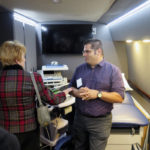Patty Tresemer of St. Mary Parish in Centerville took a day off from work as a school nurse each month to take her mother to Des Moines for treatment of psychotic depression. Her mother, who died three years ago, needed specialized treatment, which wasn’t available in Centerville.
“People need to have access to treatment close to home,” said Patty, who volunteers with the National Alliance on Mental Illness (NAMI) in honor of her mother.
A bill that would substantially improve Iowa’s mental health system advanced in the General Assembly last week. It is an answer to prayer as long as the state provides the necessary funding to implement it!
Ensuring that health care, including mental health care, is more readily available and affordable to all Iowans, is a legislative priority of the Iowa Catholic Conference (ICC). The proposed bill focuses on adults. Children’s mental health needs must be addressed as well.
Nonetheless, we ought to support House File 2456 — based on the Mental Health, Complex Service Needs Workgroup Report. The House bill passed unanimously — even in a deeply divided legislature — and has moved to the Senate Human Resources Committee. Read a description of the bill at https://tinyurl.com/yd3muol6. Then ask your state senator to support it (www.legis.iowa.gov).
One of the bill’s most important provisions is the addition of more core services that the Mental Health and Disability Services (MHDS) regions must provide (14 regions statewide), said State Rep. Cindy Winckler, D-Davenport. Those services include:
• Access Centers that provide immediate short-term assessments to people who do not need inpatient psychiatric treatment, freeing up beds for inpatient treatment;
• Intensive Residential Service Homes, which are comprehensive, 24-hour facilities that coordinate community services for persons with serious mental illnesses;
• Assertive Community Treatment Teams, which provide flexible treatment for individuals who have transferred out of an inpatient program.
Another advantage: MHDS regions would be able to contract with transportation service companies to transport patients, rather than having to rely on law enforcement or ambulance services. Mental health professionals would also be able to disclose mental health information to law enforcement agents to prevent serious threats to patients or to others.
But, the mental health bill does not include “any additional investment from the state, adding additional strain to existing services and resources,” Winckler said. Services listed in the bill are currently reimbursable by Medicaid. However, the MHDS regions would be responsible for startup costs and costs not reimbursed by Medicaid. The regions “are being asked to fund most of the bill without receiving any sort of financial assistance. In order to truly make meaningful and lasting changes to the system, it needs to be fully-funded.…”
The Iowa Senate’s reckless tax-cutting bill, which sailed to passage, is not a good omen. It would lower state revenue by $1.2 billion annually and cause reduced revenue for the 2019 budget of more than $200 million. Tell your state legislators (www.legis.iowa.gov) to pass a sensible state budget that ensures funding for mental health services to all who need them.
Mental health expert Chris McCormick Pries of Our Lady of Victory Parish in Davenport says that most people she has spoken with, regardless of age, “agree that access and availability of mental health services must expand. “As the stigma decreases and more folks are willing to acknowledge they are suffering, the wait time to get an appointment is increasing. There are not enough providers and we are not easy to get to.” She serves as clinical director of Vera French Community Mental Health Center in Davenport.
Beyond advocating for legislation, we need to educate ourselves about mental illness and challenge many of our judgments about people, McCormick Pries says. “Be less judgmental of individuals in your church who may not fit with your expectation of how they should be. We need to be open and welcoming to folks, whether we know them or not.”
We need to get informed about what challenges our communities face, take time to get educated about the mental health legislation, be active in communicating with elected officials, school personnel and religious leaders. “Mental health care is an imperative and central part of health care,” McCormick Pries says. “Whole health begins with mental health.”
Barb Arland-Fye, Editor
(arland-fye@davenportdiocese.org)











